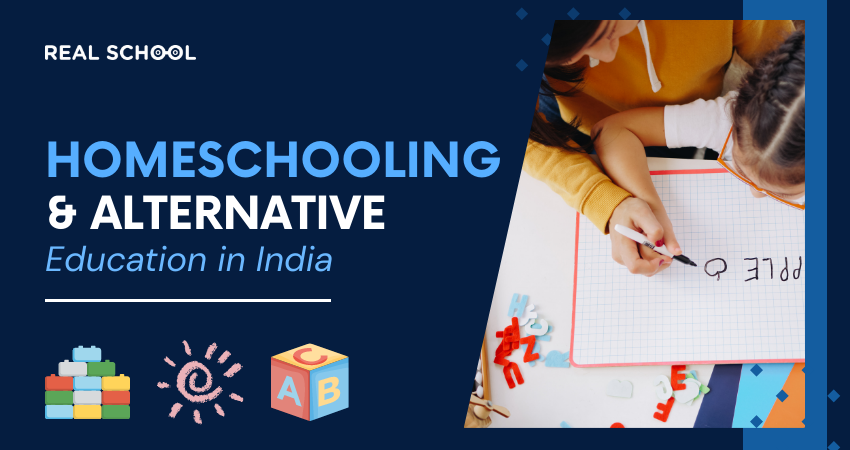Homeschooling and Alternative Education in India


The educational landscape of India, a country renowned for its rich cultural diversity, has seen a tremendous change throughout time. Although homeschooling is now a strong challenger in the alternative education space, traditional schooling is still the preferred option for many families. The world of homeschooling and alternative education in India is examined in this article, along with the factors that have contributed to it, its difficulties, and its future prospects.
The Rise of Homeschooling
Homeschooling, the practice of educating children at home rather than sending them to a traditional school, has been steadily gaining momentum in India. While precise numbers are challenging to obtain, anecdotal evidence suggests that a growing number of Indian families are choosing homeschooling as an educational path for their children.
Why Homeschooling?
Several factors contribute to the rise of homeschooling in India:
Customized Learning:
Homeschooling allows parents to tailor the curriculum to suit their child’s unique learning style, pace, and interests. This customization can result in a more engaging and effective learning experience.
Flexibility:
Homeschooling offers flexibility in terms of scheduling, allowing families to design their own routines and vacations, aligning education with life experiences.
Quality Concerns:
Some parents opt for homeschooling due to concerns about the quality of education in traditional schools. They seek to ensure a high-quality, personalized education for their children.
Philosophical Reasons:
Homeschooling can align with philosophical or cultural beliefs, such as a desire for a holistic, value-based education.
The Legal Framework
Homeschooling in India operates in a legal grey area. While there are no specific laws against homeschooling, there are also no clear guidelines or regulations governing it. The responsibility primarily falls on parents to ensure that their children receive an adequate education.
However, some Indian states have taken steps to regulate homeschooling. For instance, Tamil Nadu and Telangana require homeschooled children to take standardized exams periodically. This legal ambiguity can be a source of concern for homeschooling families, who often operate with varying degrees of support from local educational authorities.
Challenges and Concerns
Despite the advantages of homeschooling, it comes with its share of challenges and concerns in the Indian context:
Socialization:
Critics argue that homeschooled children may miss out on socialization opportunities with peers in a traditional school setting. However, many homeschooling families actively engage in community events, extracurricular activities, and local homeschooling groups to address this concern.
Teacher Qualifications:
There is no formal requirement for parents to have teaching qualifications to homeschool in India. While this flexibility is a hallmark of homeschooling, it can also raise questions about the quality of education provided.
Standardized Assessments:
The lack of standardized assessments in homeschooling can make it challenging to evaluate a child’s academic progress objectively. Some states have implemented standardized testing, but this varies across regions.
Recognition:
Concerns about the recognition of homeschooled students by colleges and universities exist. While some institutions have been receptive to homeschooled applicants, a standardized admission process for them is lacking.
Also Read: What Are The Effects Of Homeschooling
The Future of Alternative Education
As homeschooling and alternative education rise in India, their impact on the education landscape is significant. Despite challenges, the increasing demand for personalized, flexible, and quality education solidifies the permanence of alternative approaches.
Furthermore, technology advancements have expanded online learning, offering diverse materials and interactive tools to support homeschooling families.
The future of homeschooling and alternative education in India may see increased recognition, clearer regulations, and standardized assessments as more families adopt these options. This will provide a wider range of educational choices for children.
Conclusion
Homeschooling and alternative education have become significant players in India’s education arena, offering a promising path for families seeking innovative and tailored learning experiences. While challenges exist, the passion and dedication of homeschooling parents, combined with evolving educational technologies, point towards a future where alternative education continues to thrive in India. Know more – The Real School
FAQs (Frequently Asked Questions)
1. Is homeschooling legal in India?
Ans: Yes, homeschooling is legal in India, though regulations are not well-defined.
2. Why choose homeschooling in India?
Ans: Parents opt for homeschooling for customization, flexibility, and quality concerns.
3. Do Indian colleges accept homeschooled students?
Ans: Recognition varies; some institutions admit homeschooled students.
4. What challenges does homeschooling face in India?
Ans: Challenges include socialization, teacher qualifications, and standardized assessments.
5. Is online learning part of homeschooling in India?
Ans: Yes, online resources support homeschooling, offering diverse educational materials.
Recent Posts
What are the Advantages of Online Teaching at The Real School?
In the article -"What are the Advantages of Online Teaching at The Real School?" we…
What is the Full Form of School?: Unveiling the Acronym
The term "school" carries profound significance in the realm of education, representing more than just…
What is Math Full Form?: Cracking the Code
Mathematics, often referred to as "Math," is a subject that elicits various reactions from students…
What is Full Form of Homework?: Decoding Academics
Homework, an integral part of the academic journey, often raises questions about its purpose and…
What is Full Form of Teacher?: Demystifying Education
In the intricate tapestry of education, teachers stand as the pillars shaping the intellectual and…
What is Real Education?: Discovering Its Essence and Impact
The concept of real education is evolving, transcending traditional views that equate it solely with…



